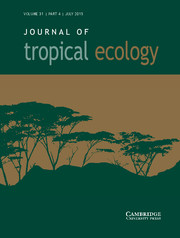Article contents
Dispersal and predation of Eschweilera ovata seeds in the Atlantic Forest of Southern Bahia, Brazil
Published online by Cambridge University Press: 13 February 2012
Extract
A majority of Neotropical rain-forest trees have fruits evolved for animal consumption suggesting that seed-dispersal mutualisms are fundamental interactions structuring these ecosystems (Howe 1986, Howe & Smallwood 1982, van Roosmalen 1985). However, whether frugivores act as seed dispersers or predators of particular plant species is unknown for most tropical trees. Trees of the family Lecythidaceae are widespread in Neotropical rain forests forming an important component of the plant community (Aparecida Lopes 2007, Mori 1990, Mori et al. 2001, Sabatier & Prevost 1990), yet studies of plant–animal interactions are few (Jorge & Peres 2005, Silvius & Fragoso 2003, Trivedi et al. 2004). Results suggest that Lecythidaceae trees with zoochoric fruits are principally dispersed by bats, birds, rodents and primates (Prance & Mori 1983), although we know little about animal interactions with Eschweilera seeds.
Keywords
- Type
- Short Communication
- Information
- Copyright
- Copyright © Cambridge University Press 2012
References
LITERATURE CITED
- 5
- Cited by


